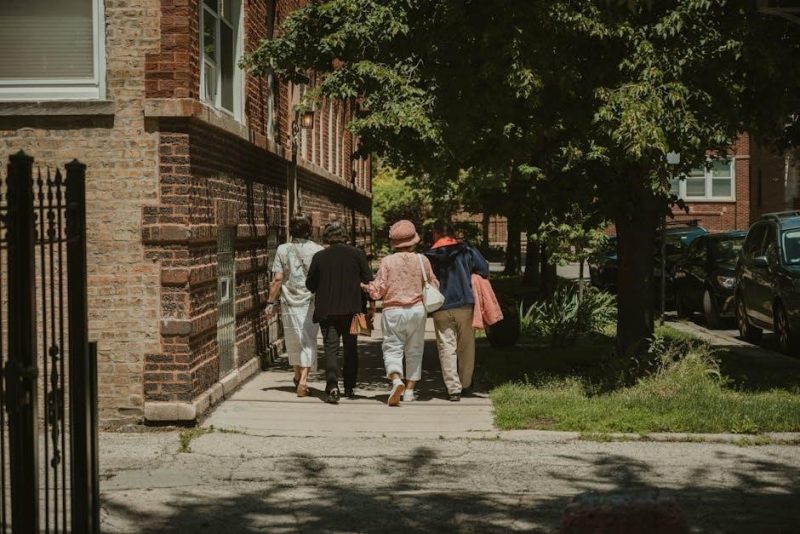chicago residential lease pdf
Get a free Chicago residential lease agreement PDF. Easy to use and customize for your rental needs. Download now!
The Chicago Residential Lease Agreement is a legally binding contract outlining rental terms between landlords and tenants in Chicago, Illinois․ It ensures compliance with local laws, including the Chicago Residential Landlord and Tenant Ordinance, and is available as a customizable PDF for easy use․
Overview of the Lease Agreement
The Chicago Residential Lease Agreement is a contract between landlord and tenant, outlining rental terms, payment details, and property use․ It covers key elements like rent, security deposits, lease duration, and responsibilities․ This document is customizable and available in PDF format, ensuring compliance with Chicago’s specific rental laws and regulations for a smooth tenancy experience․
Importance of a Written Lease in Chicago
A written lease is essential in Chicago to ensure legal compliance, outlining tenant and landlord rights․ It provides clarity on rent, security deposits, and maintenance responsibilities․ Using a Chicago Residential Lease Agreement PDF, such as the Chicago Association of REALTORS form, helps prevent disputes and ensures adherence to local regulations, protecting all parties involved․
Key Components of a Residential Lease
A residential lease in Chicago must include essential elements such as tenant and landlord identification, property description, rental terms, payment details, and security deposit information․ It should also outline lease duration, renewal options, occupancy limits, and maintenance responsibilities․ Additionally, the lease must adhere to the Chicago Residential Landlord and Tenant Ordinance to ensure legal compliance and protect both parties․
Structure of the Chicago Residential Lease Document
The Chicago Residential Lease Document is structured to include clear sections for landlord-tenant identification, property details, rental terms, and compliance with local ordinances, ensuring transparency and legal accuracy․
Parties Involved: Landlord and Tenant Identification
The lease clearly identifies the landlord and tenant, including their names, addresses, and roles․ This section ensures both parties are legally bound and aware of their responsibilities․ Accurate identification is crucial for enforcing the agreement and preventing disputes․ It is standardized in forms like the Chicago Association of REALTORS lease to maintain clarity and compliance․
Property Description and Address
This section provides the property’s full address and a detailed description, ensuring clarity and preventing disputes․ It accurately identifies the rental unit, including apartment number, building name, and specific features․ Accuracy is crucial for both parties, ensuring everyone is on the same page regarding the leased property․ This aligns with Chicago’s legal requirements․
Rental Terms and Payment Details
Rental terms specify the monthly rent, due date, and payment methods․ This section outlines the lease duration, renewal options, and any late fees․ It ensures both parties understand their financial obligations, fostering transparency and compliance with Chicago’s residential leasing regulations․ Clear payment terms help prevent misunderstandings and ensure a smooth tenancy experience for all involved․ Accuracy is key․
Security Deposit and Fees
The lease specifies the security deposit amount, which must comply with Chicago’s rental laws․ It also details allowable fees, such as late payment charges or NSF fees, ensuring transparency․ The deposit is held to cover damages or unpaid rent, and its return process is outlined․ Clear terms prevent disputes and ensure compliance with local regulations․

Legal Requirements and Compliance
Chicago residential leases must comply with the Chicago Residential Landlord and Tenant Ordinance and other local laws, ensuring fairness, transparency, and protection for both landlords and tenants․
Chicago Residential Landlord and Tenant Ordinance
The Chicago Residential Landlord and Tenant Ordinance (CRLTO) establishes rules for rental agreements in Chicago, ensuring fair treatment for both landlords and tenants․ It covers key areas such as required disclosures, security deposit regulations, and eviction protections, promoting transparency and accountability in residential leasing․
Specific Laws Governing Security Deposits
Chicago requires landlords to adhere to specific security deposit laws under the Residential Landlord and Tenant Ordinance․ Deposits must be returned within 45 days of lease termination, minus deductions for damages or unpaid rent․ Failure to comply may result in penalties, ensuring tenants’ rights are protected and landlords maintain accountability․ Proper documentation is essential for both parties․
Required Disclosures and Notifications
Landlords in Chicago must provide specific disclosures in the lease, including information about lead-based paint, bed bug policies, and the rights under the Chicago Residential Landlord and Tenant Ordinance․ Proper notifications, such as intent to terminate tenancy or make significant changes, are also mandatory to ensure transparency and legal compliance throughout the rental process;
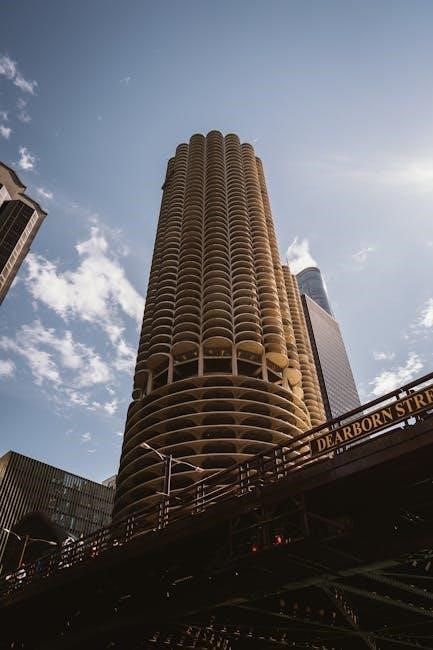
Key Clauses in the Chicago Residential Lease
The lease includes essential clauses such as rental term, payment details, security deposit terms, property use, and termination processes, ensuring clarity and compliance with local laws․
Rental Term and Renewal Options
The Chicago Residential Lease specifies the rental term, including start and end dates, and outlines renewal options․ It may include fixed-term or month-to-month agreements, detailing conditions for lease extension or termination, ensuring both parties understand their obligations and rights regarding lease duration and renewal processes․
Use of Property and Occupancy Limits
The Chicago Residential Lease outlines the permitted use of the property, typically restricting it to residential purposes․ It sets occupancy limits, ensuring compliance with local laws and safety standards․ Unauthorized use or exceeding occupancy limits may lead to legal action, emphasizing the importance of adhering to these terms for both parties’ protection․
Maintenance and Repair Responsibilities
The lease clearly defines maintenance and repair duties for both landlords and tenants․ Landlords are typically responsible for structural integrity and essential systems, while tenants must maintain the unit’s condition and report issues promptly․ Compliance with these terms ensures habitability and prevents disputes, fostering a mutually beneficial rental relationship in Chicago properties․
Termination and Eviction Processes
The Chicago Residential Lease Agreement outlines termination and eviction processes, ensuring compliance with local laws․ Landlords must provide written notice, typically 30 days for lease termination without cause or 14 days for violations․ Evictions require court approval, with tenants retaining rights to contest․ Strict legal procedures must be followed to avoid disputes and ensure fairness for both parties․
Landlord and Tenant Rights and Responsibilities
The Chicago Residential Lease Agreement outlines mutual obligations, ensuring landlords maintain habitable conditions and tenants pay rent timely․ Both parties must adhere to city ordinances and lease terms․
Landlord’s Obligations Under Chicago Law
Landlords in Chicago must maintain habitable living conditions, provide essential services like heat and water, and disclose lead paint hazards․ They are also required to provide written notice for rent increases and lease renewals, adhering to the Chicago Residential Landlord and Tenant Ordinance․
Tenant’s Rights and Protections
Tenants in Chicago are protected under the Chicago Residential Landlord and Tenant Ordinance, ensuring rights like timely return of security deposits and protection against unlawful evictions․ Tenants are also entitled to essential services such as heat, water, and a habitable living environment․ Landlords must provide written notice for rent increases and lease terminations․
Shared Responsibilities for Property Maintenance
The Chicago Residential Lease Agreement outlines shared responsibilities for property maintenance․ Tenants must maintain cleanliness and report issues promptly, while landlords are responsible for major repairs, such as plumbing and structural integrity; Both parties must ensure compliance with city codes and safety standards to preserve the property’s condition and habitability․
Completing the Chicago Residential Lease Agreement
The lease must be filled out accurately, with both parties reviewing and signing․ It is available as a fillable PDF for convenience and legal compliance․
Step-by-Step Guide to Filling Out the Lease
Begin by entering the landlord’s and tenant’s personal details, followed by the property address․ Specify the rental term, monthly rent, and security deposit․ Outline maintenance responsibilities, occupancy limits, and payment terms․ Attach any additional clauses if needed․ Both parties must sign and date the document, with witnesses if required, ensuring legal compliance․
Signatures and Witness Requirements
Both the landlord and tenant must sign the lease, with signatures dated to confirm agreement․ Witnesses may be required to attest to the signing, ensuring the document’s validity; This step is crucial for legal enforceability, as it confirms mutual acceptance of the terms outlined in the Chicago Residential Lease Agreement․
Electronic Signatures and PDF Formats
Electronic signatures are widely accepted for Chicago residential lease agreements, offering convenience and efficiency․ The lease is often provided in PDF format, allowing easy customization and digital signing․ This modern approach streamlines the process, ensuring legality and accessibility for both landlords and tenants while maintaining the document’s professional integrity and compliance with local regulations․

Common Mistakes to Avoid
- Omitting key clauses, such as security deposit terms or tenant rights․
- Incorrectly calculating rental amounts or payment due dates․
- Non-compliance with Chicago’s Residential Landlord and Tenant Ordinance․
Errors in Lease Agreement Preparation
Common mistakes include incorrect tenant names, typos in property addresses, and miscalculations of rent or security deposits․ Non-compliance with Chicago’s Residential Landlord and Tenant Ordinance is another frequent error․ Missing signatures or dates can invalidate the agreement․ Ensure all terms are clearly outlined to avoid disputes and legal issues later․ Proper preparation is essential for enforceability․
Omissions in Key Clauses
Omissions in key clauses, such as security deposit terms, eviction grounds, and tenant responsibilities, can lead to legal disputes․ Failing to include required disclosures, like lead paint notices or landlord contact information, violates Chicago laws․ Omitting lease renewal options or subletting policies can also cause conflicts․ Ensure all critical clauses are included for clarity and compliance with local regulations to avoid potential legal issues․
Non-Compliance with Local Laws
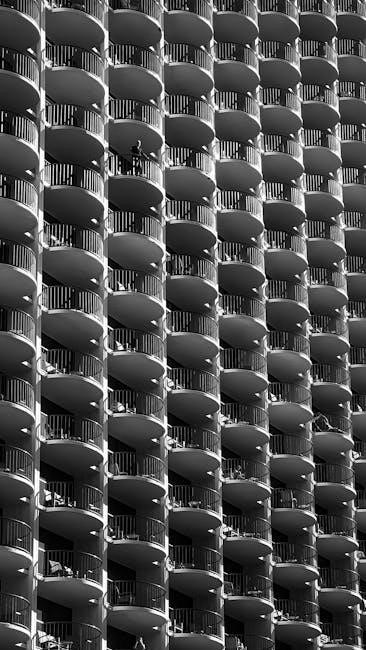
Non-compliance with Chicago’s Residential Landlord and Tenant Ordinance can result in legal penalties․ Failing to provide required disclosures, such as lead paint notifications or building code violations, violates city regulations․ Ignoring security deposit laws, including interest payments and itemized deductions, can lead to fines․ Ensure all lease terms align with local statutes to avoid legal repercussions and financial losses․
Amendments and Renewals
The lease may be modified by mutual agreement in writing․ Renewal terms must be negotiated, and any changes should comply with Chicago’s rental laws and regulations․
How to Modify the Lease Agreement
To modify the lease, both landlord and tenant must agree in writing․ Changes should be signed by all parties and comply with Chicago’s rental laws․ Any amendments must align with the Chicago Residential Landlord and Tenant Ordinance to ensure legality and avoid disputes․
Renewal Process and Terms
The lease renewal process requires mutual agreement between landlord and tenant․ Typically, a 30-day notice is needed before the lease expires to negotiate new terms․ Rent increases or changes must comply with Chicago’s rental laws․ The renewal should be documented in writing, ensuring both parties agree to updated terms before signing․
Notifying Tenants of Changes
Tenants must be notified in writing of any lease changes, such as rent increases or policy updates․ Landlords are required to provide a minimum of 30 or 60 days’ notice, depending on the change․ The notice should clearly outline the modification and its effective date, allowing tenants to review and agree or terminate the lease․ Compliance with Chicago’s rental laws is essential․

Chicago-Specific Lease Forms and Resources
Chicago-specific lease forms and resources are available to ensure compliance with local laws․ The Chicago Association of REALTORS lease form and City of Chicago Housing Authority requirements are key resources․
Chicago Association of REALTORS Lease Form
The Chicago Association of REALTORS lease form is a widely used template for residential rentals in Chicago․ It ensures compliance with local ordinances and provides a comprehensive outline of terms, including rental payments, security deposits, and tenant responsibilities․ Available in PDF format, it’s customizable to suit various property types and landlord needs effectively․
City of Chicago Housing Authority Requirements
The City of Chicago Housing Authority (CHA) imposes specific requirements for residential leases, ensuring compliance with affordable housing programs and tenant protections․ These requirements are integrated into lease agreements to maintain fairness and transparency between landlords and tenants, particularly for properties managed by CHA or participating in housing assistance programs within the city․
Online Templates and PDF Downloads
Chicago residential lease agreements are widely available as downloadable PDF templates, offering convenience for landlords and tenants․ These fillable forms, often provided by the Chicago Association of REALTORS, ensure compliance with local laws and streamline the leasing process; They can be easily customized to suit specific rental properties and terms in Chicago․
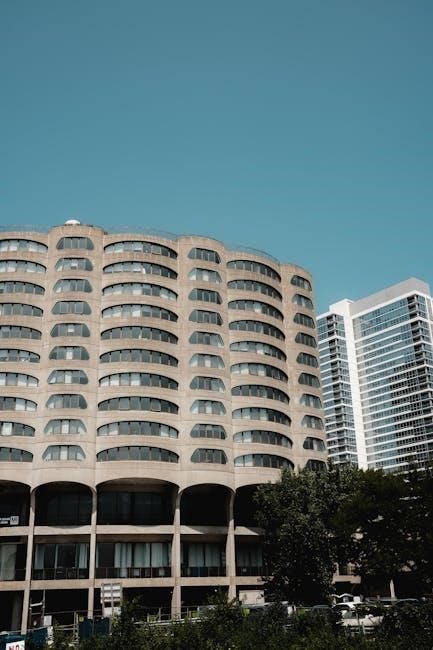
Eviction Prevention and Lease Enforcement
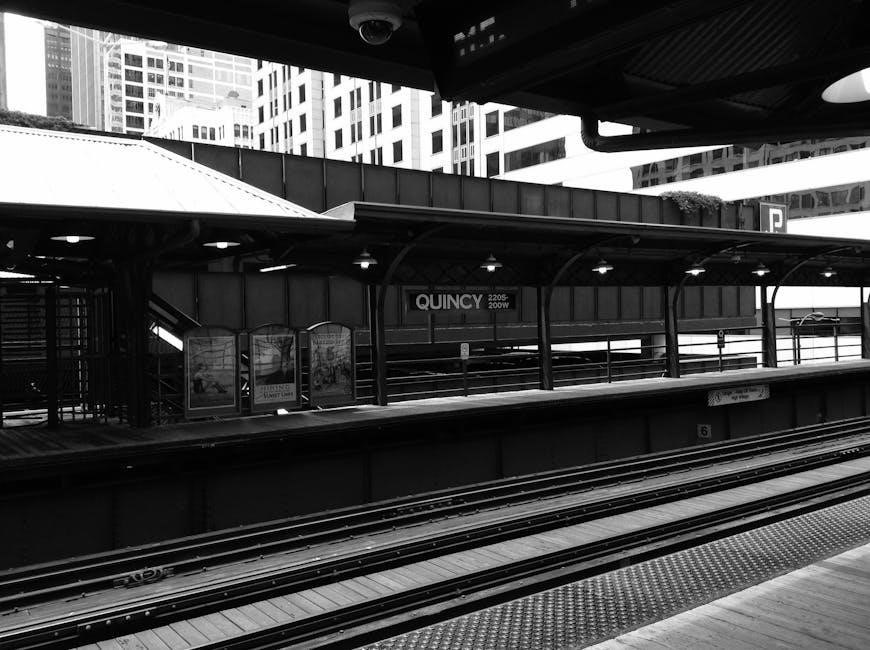
Chicago’s eviction prevention programs and lease enforcement measures ensure compliance with local ordinances, protecting tenant rights while maintaining landlords’ legal remedies for addressing lease violations․
Grounds for Eviction in Chicago
In Chicago, eviction can occur for non-payment of rent, lease violations, illegal activities, or if the tenant refuses to renew the lease․ The landlord must provide proper notice and follow legal procedures under the Chicago Residential Landlord and Tenant Ordinance to ensure evictions are lawful and tenants’ rights are protected․
Legal Process for Eviction
The legal process for eviction in Chicago begins with a written notice to the tenant, such as a 5-day notice for non-payment of rent․ If unresolved, the landlord files a court case, serves a summons, and obtains a court order․ Law enforcement then executes the eviction, ensuring compliance with all local regulations and tenant rights protections․
Mediation and Dispute Resolution
Mediation is a cost-effective way to resolve disputes between landlords and tenants in Chicago․ The process involves neutral third-party facilitation to negotiate agreements․ The Chicago Department of Housing offers resources to help resolve issues like rent disputes or lease violations․ Mediation aims to maintain positive landlord-tenant relationships while ensuring compliance with local laws and lease terms․

The Chicago Residential Lease Agreement is essential for ensuring compliance with local laws and fostering positive landlord-tenant relationships․ Proper documentation and adherence to the lease are crucial for a smooth rental process․
Importance of Adhering to the Lease Agreement
Adhering to the Chicago Residential Lease Agreement is crucial for both landlords and tenants․ It ensures compliance with local laws, prevents disputes, and outlines clear responsibilities; Timely rent payments, property maintenance, and lease term adherence are essential․ Non-compliance can lead to legal consequences, emphasizing the need for mutual respect and understanding of the agreement․
Future of Residential Leasing in Chicago
The future of residential leasing in Chicago is expected to emphasize digital advancements, such as electronic signatures and online lease management․ Sustainability and energy-efficient properties may become more prominent․ Urban regeneration projects, like those in River South, could reshape housing options, offering a mix of residential, retail, and community spaces, aligning with modern living demands and legal standards․
Recommendations for Landlords and Tenants
Landlords should ensure leases comply with the Chicago Residential Landlord and Tenant Ordinance and use official forms like the Chicago Association of REALTORS lease․ Tenants should carefully review agreements, understand their rights, and request changes before signing․ Both parties should maintain open communication and document all terms to avoid disputes and ensure a smooth rental experience․

